

KUOW Blog
News, factoids, and insights from KUOW's newsroom. And maybe some peeks behind the scenes. Check back daily for updates.
Have any leads or feedback for the KUOW Blog? Contact Dyer Oxley at dyer@kuow.org.
Stories
-
Lummi Nation opposes BP's oil plans for Cherry Point
Business
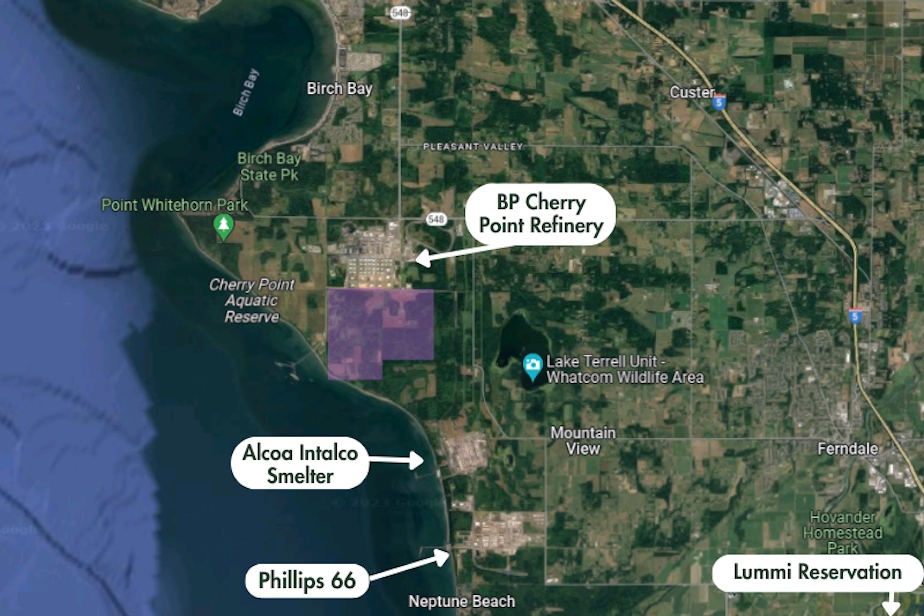 Cherry Point, near Ferndale, Washington, is home to multiple industrial operations, such as the Phillips 66 oil refinery, the Alcoa Intalco aluminum smelter, and BP's Cherry Point oil refinery which is the largest refinery in the Northwest. The highlighted area is a rough approximation of where BP aims to purchase property and potentially expand operations. The Lummi Nation calls this area "Xwe’chi’eXen," and considers it a heritage/cemetery site where many members have been buried in the past.Google Maps / KUOW
Cherry Point, near Ferndale, Washington, is home to multiple industrial operations, such as the Phillips 66 oil refinery, the Alcoa Intalco aluminum smelter, and BP's Cherry Point oil refinery which is the largest refinery in the Northwest. The highlighted area is a rough approximation of where BP aims to purchase property and potentially expand operations. The Lummi Nation calls this area "Xwe’chi’eXen," and considers it a heritage/cemetery site where many members have been buried in the past.Google Maps / KUOWThe Lummi Nation is voicing its opposition to British Petroleum's goal of expanding oil operations at Cherry Point, near Ferndale, Washington, north of Bellingham.
The Lummi call this area "Xwe’chi’eXen," consider it a cultural and archaeological site where many of its ancestors lay, and have a track record of pushing back against industrial activity and development of Cherry Point. The tribe also argues that BP's industrial operations would interfere with its fishing rights.
RELATED: Olympic Pipeline leaks 25K gallons of gasoline into Skagit River delta
"For thousands of years, and continuing to this day, our people have lived here, fished here, gathered plants here, raised families here, and buried loved ones here,” Lummi Nation Chairman Anthony Hillaire said in a statement. “The connection the Lummi Nation has to this place is beyond archeological significance. We have a sacred obligation to protect our lands and our ancestors, the ancient ones who rest here. We also have a moral and legal obligation to protect our rights. We have opposed, and will continue to oppose, the development of Xwe’chi’eXen because of the unavoidable and unacceptable impacts it would have on our people and on our treaty fishing rights.”
A BP spokesperson told KUOW that the company notified the Lummi Tribe about the land purchase on Dec. 13. The sale was completed on Dec. 22. BP said that the total price tag is confidential, however, a public tax document states that the total price for all parcels was $49.9 million.
Cherry Point is already home to a handful of industrial operations, mixed between vacant, undeveloped land, and small housing developments.
BP currently operates its Cherry Point Refinery there, the largest refinery in the Northwest. The Olympic Pipeline runs alongside it, leading down to a docking facility for ships. BP also owns the land to its east, which leads down to the Cherry Point Aquatic Reserve along the shoreline. The land BP has acquired is located to the refinery's south, and includes additional shoreline property.
BP says this new property will be used as a "buffer area" for its existing refinery operations, similar to the vacant land it owns east of its Cherry Point facility. A spokesperson also said the acquisition is also intended to, "Increase the opportunity, as appropriate, for future environmental restoration and wetlands mitigation."
The company also wants to expand access to Gulf Road which is used to off-load large equipment and construction materials.
And finally, BP bought the land to, "provide options for possible future projects at the refinery, pending approvals."
Also on Cherry Point, Phillips 66 operates its Ferndale oil refinery. The Lummi Nation further says it opposes the company's plans for a renewable diesel refinery. Phillips 66 previously pursued a renewable diesel refinery at Cherry Point, which aimed to recycle waste oils and fats into fuel. It abandoned that project in 2020.
RELATED: Price of pollution in Washington hits $2 billion
Alcoa's Intalco site is also located at Cherry Point. It has produced aluminum, with an annual capacity of 279,000 metric tons. Alcoa is in the process of closing down this location, however, and has an agreement with AltaGas — a Canadian natural gas company — to take over 1,600 acres of the site.
KUOW has reached out to the Lummi Nation for comment. This post will be updated with any responses.
This post was originally published on Dec. 27, 2023. It was updated on Dec. 28 and Dec. 29, 2023 with comments from a BP spokesperson and the price for the property sale.
Continue reading » -
Seattle crews remove Black Lives Matter garden in Cal Anderson Park
Since 2020, Seattle's Parks and Recreation Department has often warned that it intended to take down or relocate a Black Lives Matter garden in Cal Anderson Park, despite support for the garden from some community members. On Wednesday, the department finally followed through on that intention and removed the garden.
"In recent months, the temporary garden has created unsafe conditions for all park users, including the vandalism of Cal Anderson public bathrooms, public drug use, unauthorized camping, and a significant rodent problem, along with other issues," the city's Parks Department said in a statement Wednesday.
RELATED: Cal Anderson BLM garden to be removed by city despite pushback
The removal is the latest chapter in the garden's three-year story, which has been filled with dueling voices over its place in Seattle's Black Lives Matter movement and protests against police violence.
The department said that the "makeshift garden" was removed due to public health and public safety issues. The statement said that the area required maintenance, such as reseeding and turf restoration.
As part of the removal, Seattle's Unified Care Team also cleared a nearby encampment. Parks officials noted that this is the 76th time the city has "resolved" encampments in Cal Anderson Park in 2023 alone.
While an online petition to keep the garden received more than 5,000 signatures, city parks officials said there was also "significant feedback" from the public favoring moving the garden to another location in the park. The area where it was located, called the "Sun Bowl," is intended for large gatherings in the park. The department said this made the location of the garden inappropriate.
The Parks Department also said it will partner with Black Farmers Collective and leaders in Seattle's Black community to create a new garden at Cal Anderson Park. Among the voices in that partnership is Councilmember-elect Joy Hollingsworth, who is slated to represent District 3 where Cal Anderson Park is located.
“We should continue to maintain all Seattle parks to be safe, clean and welcoming," Hollingsworth said in a statement. "Cal Anderson Park is the living room of Capitol Hill and a focal point of our city. It’s important that we prioritize sanitary conditions within shared public spaces so that our neighborhoods can continue to flourish."
BrownGirlFarmer's Mariay Rose Jones also commented: "As a 20-year-old farmer, navigating the fields of the Black Lives Matter Memorial Garden as the ‘Brown Girl Farmer’ has been a complex journey. Sadly, each attempt to immerse myself in farming activities has been overshadowed by the pervasive drug activity within the space. For someone of color like me, this Memorial Garden seems far from representing the essence of farming and agriculture."
Continue reading » -
Trees and contaminated soil are removed following gas pipeline spill in Skagit County
Crews have begun removing trees and contaminated soil in Skagit County, following a gasoline line spill in Conway earlier this month.
Approximately 25,000 gallons were released from a BP-owned pipeline on Dec. 10 after a pressure check valve failed. The pollution flowed into an irrigation canal called Hill Ditch. That ditch feeds into Bulson Creek, and that water eventually flows into the Skagit River delta. Response crews deployed 1,600 feet of absorbent boom to catch any spilled gas as far as 2.5 miles downstream.
RELATED: This week’s catch on the Skagit delta — Tasty crabs, toxic soil
Washington's Department of Ecology ran tests and concluded that none of the spill reached local water wells in the area surrounding Hill Ditch. Surface water tests are still underway at 16 sites. Contaminants from the spill were identified along at least one-third of a mile of shoreline.
While local wells appear to be unaffected, so far, damage to the soil and trees along Hill Ditch are another matter. The trees are being removed along the edge of the canal and neighboring farmland. The the soil will then be trucked away. That work is expected to wrap up by the end of the week.
Contaminated soil is being loaded onto trucks and transported to a hazardous waste facility in Arlington, Oregon.
In the wake of the spill, Ecology has found a handful of dead animals — one beaver, a pine siskin bird, a mallard duck, and an American widgeon duck.
Continue reading » -
What should Washington call its next new apple?
What's in a name? For Washington state's newest apple, the answer is, "about 25 years and a lot of branding." In 2024, Washingtonians will have an opportunity to get in on the next step for WA-64.
That's the name Washington State University has been calling an apple it started developing in 1998,and will soon be ready for the market. But that name won't stick. WSU wants 2024 to be the year it discovers the name that WA-64 will hit the shelves with.
RELATED: Why 2023 was a "vintage year" for Washington apples
"We hope that folks are excited about the apple, even though they can't taste it or buy it for several years," said Jeremy Tamsen, WSU's director of innovation and commercialization, while talking with KUOW in August. "We're interested in getting input ... so we can find a name that really hits a home run with this apple."
Expectations may be heightened due to the massive success of WSU's last apple release, the Cosmic Crisp (originally called WA-38), which also went through years of development and branding.
A naming contest for WA-64 is anticipated for spring 2024. WSU will likely then put a handful of names and branding packages through focus groups to get the winning title.
Can an apple, by any other name, be as sweet?
The new name produced in 2024 will be the next step, out of many, to get this apple into stores. In fact, it takes many, many steps for WSU to produce a commercially viable apple.
The first step for WA-64 was taken in 1998, when WSU crossed a Honeycrisp with a Cripps Pink (more well-known in the United States by its trade name "Pink Lady"). That was followed by years of testing and cultivation.
A patent was filed in 2022. Commercial trees won't be available until 2026, and the first apples to hit store shelves won't be harvested until 2029.
Continue reading » -
What the Tacoma officer acquittals could mean for future police trials
Law & Courts
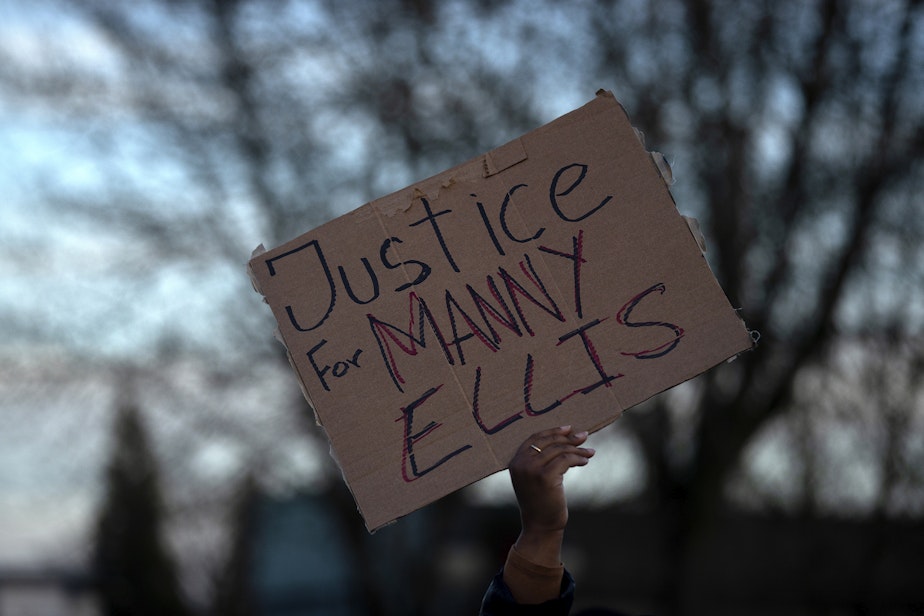 Justice for Manny Ellis reads a handwritten sign as a crowd gathered at the intersection of 11th Street and Martin Luther King Jr. Way, after a jury found three Tacoma police officers not guilty in the trial over the death of 33-year-old Manuel Ellis, on Thursday, December 21, 2023, in Tacoma.KUOW Photo/Megan Farmer
Justice for Manny Ellis reads a handwritten sign as a crowd gathered at the intersection of 11th Street and Martin Luther King Jr. Way, after a jury found three Tacoma police officers not guilty in the trial over the death of 33-year-old Manuel Ellis, on Thursday, December 21, 2023, in Tacoma.KUOW Photo/Megan FarmerThis week, a jury in Pierce County Superior Court found three officers not guilty of the 2020 death of Manuel (Manny) Ellis, a Black man, in their custody.
Ellis, 33, died during an encounter with Tacoma police during which he was handcuffed, hogtied, and had a spit hood placed over his head. He told officers he could not breathe while being restrained. The medical examiner concluded his death was a homicide.
The officers' defense team argued that Ellis' death was the result of a heart condition and the methamphetamine found in his system.
KUOW followed up on the case with two legal experts to assess how it played out in court, what was behind the verdict, and what it means moving forward.
- Deborah Ahrens is a professor at Seattle University School of Law, where she is also vice dean for intellectual life. She previously worked for the ACLU and as a state public defender in Richland County, South Carolina.
- David Owens is an assistant professor at the University of Washington Law School, and is a full-time civil rights attorney. He previously represented the family of Isaiah Obet, who was killed by an Auburn police officer in 2017, and the family of Mi'Chance Dunlap-Gittens who was killed by King County sheriff deputies in Burien in 2017.
Decisions that influenced the trial
Both lawyers pointed to how decisions around what was allowed in court influenced the trial. In short, Manny Ellis' history was allowed as evidence while the police officers' history was not.
“I think that there were some rulings pre-trial … like the history of one of the police officers at the police academy that had raised some antenna about whether or not he was using force in situations where he shouldn't," Ahrens said. "The trial court kept that information from the jury; the jury probably would have liked to have that information. It might have caused them to view their stories differently.”
Owens said that the jury was able to hear about Ellis' past encounters with police, and drug use.
“I was shocked to hear in the opening arguments, and then it was part of the case itself, the idea that the officers were permitted to introduce information about Manny Ellis' alleged prior contacts with police officers, alleged prior drug use, things like that. In the law, we call this 'propensity evidence'.
Continue reading » -
Only 4% of detained youth are offered attorney access by Seattle police, audit finds
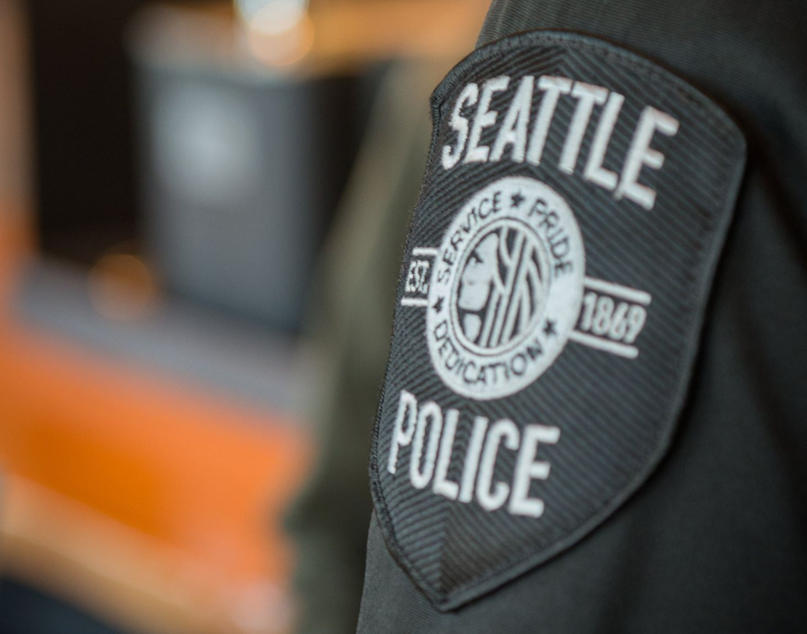 Seattle Police Department / Facebook
Seattle Police Department / FacebookTwo out of every 50. That's the rate of youth getting legal counsel after being detained by Seattle police officers, according to a new audit of the department.
The audit found that in the two years following the passage of a law requiring youth access to legal counsel, Seattle police officers only complied 4% of the time, despite being trained on the requirement.
“This is one of the most straight forward civil rights protections we’ve enacted — police should not be able to question children until they have talked to a lawyer," Seattle Councilmember Lisa Herbold said in a statement.
The audit was performed by Seattle's Office of Inspector General at Herbold's request.
"It’s such commonsense legislation that King County and then all of Washington state adopted it soon after we did. That Seattle police officers were only following this law 4% of the time is very disappointing. We know it’s possible to comply with this law — nearly every law enforcement agency in Washington state appears to have done so.”
Juvenile access to an attorney
Continue reading » -
The Year in Pictures: Memorable moments of 2023
Arts & Life
 KUOW Photos by Megan Farmer and Juan Pablo Chiquiza
KUOW Photos by Megan Farmer and Juan Pablo ChiquizaIn the last year in Seattle and western Washington, we witnessed moments of both heartache and joy. Loss and celebration. Community and resilience.
F
rom protests to floods, wildfires to pointe shoe fittings, we documented the lives and stories of Washingtonians as the year's events unfolded. In April, Indigenous survivors of the federal Indian boarding school system shared their experiences with U.S. Secretary of the Interior Deb Haaland, on the "Road to Healing" tour. In July, Wedgewood neighbors rallied to save a roughly 200-year-old ancient cedar tree, Luma, from development. In September, 57,000 Beyonce fans dressed to impress during the Seattle stop of her Renaissance tour.
Here are some of the images that stayed with us.
'I'm still healing.' Boarding school survivors recount stories of abuse, trauma
Continue reading » -
WA lawmakers propose to ban companies like Amazon from spending on local elections
Politics

A new campaign finance bill that targets election spending by big companies will be introduced in Washington state in the coming session.
The bill would specifically prohibit "foreign influenced" corporations from spending any money at all on state or local elections in Washington. By "foreign influenced," lawmakers mean a company that has a significant amount of stock owned by people from other countries.
Rep. Sharlett Mena (D-Tacoma), who is sponsoring the bill, said her goal is to level the political playing field.
“That’s really important to me as someone who doesn't come from a family that's well connected or has a lot of money,” Mena said. “Ensuring that we can hear more from the folks that live in our communities as opposed to folks who are somewhere else and care more about the economic landscape for their business.”
Foreign nationals are already banned under federal law from participating in elections. Mena said her bill would close what she calls a “loophole” to that ban, which she sees occurring through foreign stock ownership.
Under the proposed law, any company that issues stock with 1% ownership by a single foreign national, or 5% in the aggregate of several foreign nationals, would not be allowed to make contributions.
Seattle passed a similar campaign finance law in 2020, after Amazon poured over a million dollars into city council races the prior year. Local law has since then prevented public corporations including Amazon from spending on city elections.
The idea is that because companies are answerable to shareholders, foreign stock ownership could, in practice, mean foreign “influence,” Mena said.
To illustrate her point, Mena brought up a climate ballot measure that voters rejected in 2018 after large companies rallied against it. Mena said that "foreign-influenced" corporate opponents spent about $31 million to defeat Initiative 1631, which would have taxed carbon emissions from big businesses in the state, with an aim of lowering pollution."
“Almost all of that came from BP, and also funding from Phillips 66, Koch Industries, Valero, and these are all companies with massive foreign influence who care about protecting their profit,” she said.
Mena's proposal would not prevent wealthy individuals — or groups like labor unions or real estate associations — from unlimited spending on political action committees.
Critics of Mena's new bill say it would unfairly restrict the First Amendment right of companies to participate independently in campaigns.
Continue reading » -
Jury rules in favor of 5 Black UW police officers in racial harassment case
 The University of Washington Police Department.
The University of Washington Police Department.A jury ruled Thursday in favor of five Black University of Washington police officers who accused the school's police department of racial harassment and discrimination.
The ruling in King County Superior Court includes more than $16 million in damages.
While the amounts vary among the officers when it comes to past financial damages, all were awarded $2 million in emotional damages, and four were awarded more than $1 million in future damages.
Following the decision, the University of Washington issued the following statement:
We are disappointed in the decision reached by a King County Superior Court jury today in a racial harassment and retaliation case brought by four former officers and one current UWPD officer. Our attorneys are reviewing options for our next steps, including the potential for an appeal.
The University of Washington is committed to providing a safe, secure and welcoming working environment for all staff. This case alleged issues that took place largely under previous leadership and went unreported through official channels. The allegations of racial harassment and retaliation are deeply disturbing and counter to the UW’s commitment to fostering a diverse, inclusive and equitable community. We are confident that under UWPD’s new leadership — including a new Chief of Police and new leadership team — the department will remain focused on mission-driven service, continuous improvement, building meaningful relationships with the communities UWPD serves and ensuring the department lives up to its values of professionalism, respect, integrity, diversity and excellence.
Lawsuit against UW Police Department
The lawsuit was filed by five officers with UW's Police Department two years ago. They alleged widespread racial harassment and discrimination in the workplace, such as use of racial slurs, stereotypes, physical intimidation, and preferential treatment of white officers.
The lawsuit stated that such behavior was heightened after the murder of George Floyd and amid the protests of 2020.
The officers said they were retaliated against for speaking up about the issues. While the court upheld allegations of harassment and discrimination Thursday, it did not find that the officers were retaliated against by the department.
After the lawsuit was filed, one of the officers said their brake lines were cut, and another said someone shot at their home, shattering a window.
Four of the plaintiffs have left the department, and law enforcement, since the lawsuit was filed.
UW President Ana Mari Cauce previously commented that none of the allegations among the university's police department were ever reported to UW leadership.
Cauce said in 2021 that such issues "were not reported through union representatives, and they did not surface during an independent review of the department in 2019."
Continue reading » -
Grinch fungus is coming for Northwest's Christmas trees
 Christmas trees at a farm in Western Washington and other growing sites in the Northwest were killed by root diseases. Chastagner and his team plan to survey tree farms in 2024 to find out more about the pathogens affecting ornamental conifers.
Christmas trees at a farm in Western Washington and other growing sites in the Northwest were killed by root diseases. Chastagner and his team plan to survey tree farms in 2024 to find out more about the pathogens affecting ornamental conifers.Like a Grinch with a grudge against holiday greenery, a fungus is targeting the Northwest's Christmas trees. That’s essentially the findings of new research exploring how climate change is affecting the region’s tree farms.
RELATED: "Rockin' Around the Christmas Tree" goes to No. 1 — after 65 years
Gary Chastagner, aka “Doctor Christmas Tree,” is a plant pathologist at Washington State University. He’s been working with Christmas trees for nearly 50 years. Over the last couple years, he says there’s been an uptick in sick trees.
“There's a variety of diseases that affect the production of Christmas trees, many of them are caused by fungi,” Chastagner said.
Christmas trees are generally a non-irrigated crop, so hotter summers can stress fir trees, leaving them more susceptible to disease. On top of that, more rain in the spring and fall (like the past few years) also cause problems. A changing climate means more rain, which can oversaturate tree roots, causing fungi to grow, Chastagner said. Fungi then affects the roots of the trees, choking them until they die.
“Some trees may be more tolerant to the moisture stress and drought stress,” Chastagner said. “Those are the trees that growers could utilize to avoid the problems that we're seeing now in the future.”
He notes that scientists are currently experimenting with Eurasian fir trees, to see if they are more tolerant to drought conditions. Chastagner and his team plan to survey multiple growing sites in Washington and Oregon throughout 2024, with the aim of helping to find solutions.
According to the Pacific Northwest Christmas Tree Association, Oregon is the top Christmas-tree producing state, and Washington ranks sixth.
Read the full story at Northwest Public Broadcasting.
Continue reading » -
'It adds up.' Consumer group alleges Starbucks' app traps customers into paying more
Technology
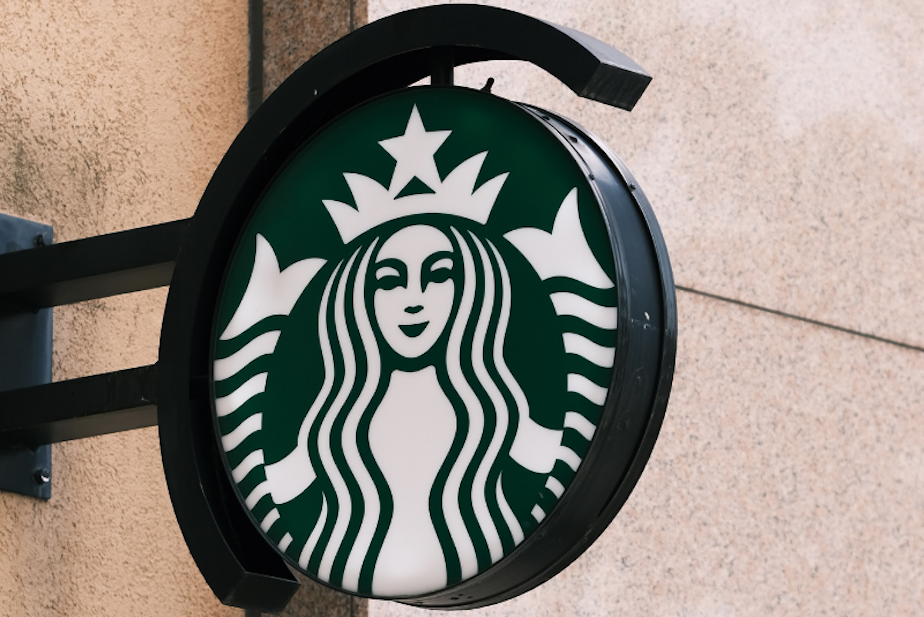
Consumer advocates are calling on the Washington State Attorney General's Office to investigate what they say are manipulative practices related to Starbucks' Rewards program.
Speaking outside the Starbucks First Avenue and Pike Street shop, advocates recently argued that the coffee giant's mobile app is designed to make it difficult for consumers to spend down existing balances.
RELATED: Starbucks increases U.S. hourly wages and adds other benefits for non-union workers
Misha Wershkul, executive director of the Washington State Budget and Policy Center, laid out a typical scenario. Say a customer wants to make a purchase that costs $6.50, and has a $5 balance on the app.
“I’m not able to add just $1.50 to cover my full purchase,” Wershkul said. “I’m actually required to reload a specific amount. So, I would add another $10.”
Continue reading » -
JuneBaby, acclaimed Seattle soul food restaurant, to close at year’s end
Arts & Life
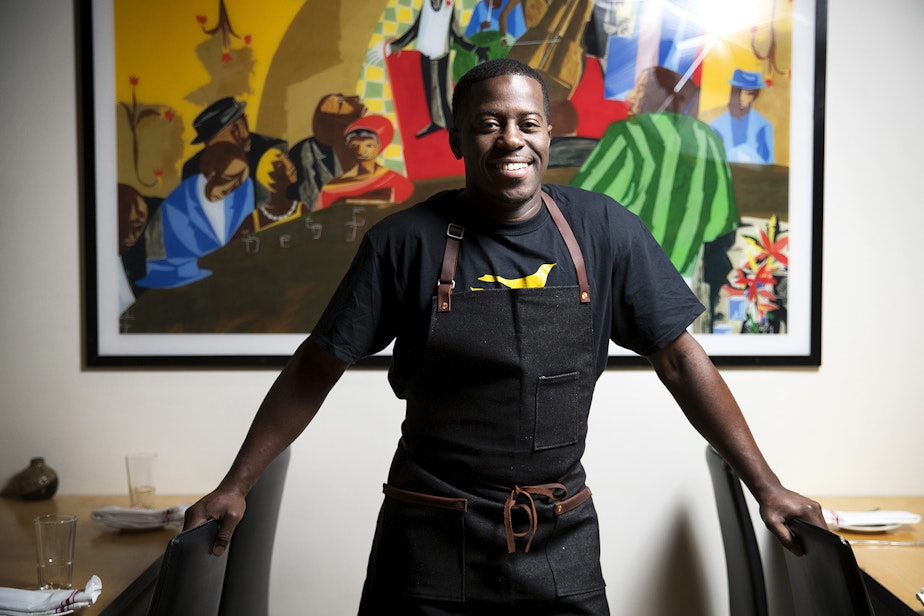 Edouardo Jordan poses for a portrait on Wednesday December 6, 2017, at JuneBaby in Seattle.KUOW Photo/Megan Farmer
Edouardo Jordan poses for a portrait on Wednesday December 6, 2017, at JuneBaby in Seattle.KUOW Photo/Megan FarmerThe restaurant that put Seattle on the map for Southern cooking will soon close. Chef Edouardo Jordan announced he’s closing JuneBaby permanently.
JuneBaby opened in 2017, a follow-up to Jordan’s first restaurant, Salare. Unlike Salare’s Italian and French influences, JuneBaby focused on recipes from Jordan's grandmother’s cooking, including fried chicken, chitterlings, and pound cake.
The following year, JuneBaby was named the James Beard Award’s Best New Restaurant. That same week, it received rave reviews from The New York Times.
But in 2021, The Seattle Times reported on allegations of sexual misconduct against Jordan, prompting most of Jordan's to walk out. Seven months later, JuneBaby reopened.
In an interview with KIRO Radio in September, Jordan said he has gone through a lot of sexual harassment training, and has been reflecting on the experience.
Jordan announced JuneBaby will close at the end of this month. Salare closed in 2022.
Continue reading »
